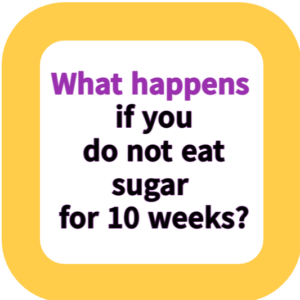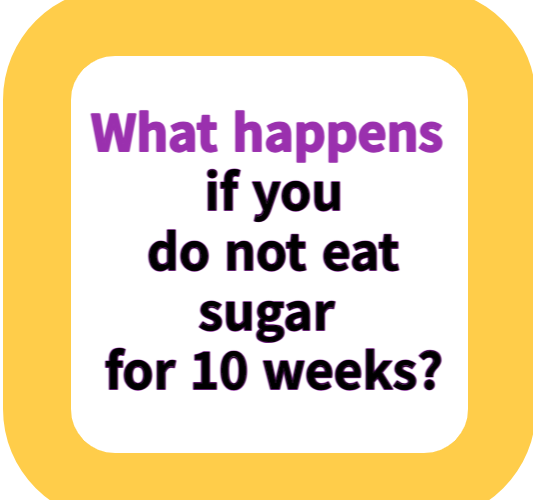What happens if you do not eat sugar for 10 weeks?
Embarking on a sugar-free journey is both a challenging and enlightening experience, one that transforms not just your diet but your overall approach to health and well-being.
In this blog, we dive deep into the personal odyssey of cutting sugar out of one’s life, detailing the weekly challenges, withdrawal symptoms, and the remarkable transformations that follow.
From the initial temptation to resist sweets to the profound physical and mental benefits gained, this narrative offers an honest and detailed exploration of what it truly means to live without sugar.
Through this journey, we discover the importance of moderation, the struggles of withdrawal, and the ultimate rewards of improved health, clearer skin, better sleep, and enhanced immunity.
Join us as we navigate the highs and lows of a sugar-free lifestyle, offering insights, tips, and encouragement for anyone looking to make a similar change.
This blog isn’t just a recount of personal experience; it’s a guide to rethinking our relationship with sugar and taking steps towards a healthier, more balanced life.
What happens if you do not eat sugar for 10 weeks?

Introduction
Embarking on a sugar-free journey represents a significant physical and mental challenge, yet it paves the way toward numerous health benefits. This document meticulously details the experience of abstaining from sugar consumption over an extended period.
It outlines the progress made week by week, the challenges encountered, and the ultimate rewards of living without sugar. This journey is not just about resisting the temptation but understanding and experiencing the profound changes that occur within the body and mind.
Week 1: The Temptation Phase
The first week is characterized by a strong desire for sugar. Surrounded by the enticing aromas of cakes and chocolates, the challenge is to resist consuming these sweet treats.
Despite being tempted, one manages to avoid succumbing to these cravings. Although there are no significant physical changes during this initial phase, the mental battle to resist sugar begins, marking the first test of willpower
Week 2: Withdrawal Symptoms Begin
Entering the second week without sugar, withdrawal symptoms start to surface. Headaches become more frequent, signaling the body’s craving for sugar—not for its taste but for the impact it has on the brain’s functioning. This week tests one’s resolve as the absence of sugar begins to physically manifest in uncomfortable ways.
Week 3: Deepening Withdrawal
As the journey continues, the withdrawal symptoms intensify. Energy levels drop noticeably, and the craving for sugar shifts from a desire for its taste to a need for its effects on brain function. This period is challenging, as the body and mind adjust to functioning without the constant highs and lows sugar consumption provides.
Week 4: The Turning Point
By the fourth week, a significant turning point is reached. The peak of withdrawal symptoms is surpassed, and a notable improvement in mental clarity is experienced. The absence of sugar-induced fluctuations begins to yield benefits, such as more stable energy levels and improved focus.
Week 5: Physical Improvements
Physical benefits become apparent. Movements feel lighter and more agile, and an increase in strength is noticed. This phase marks the beginning of the body’s adaptation to a life without artificial sugar, showcasing the positive impact of the dietary change.
Weeks 6-8: Benefits Consolidate
During these weeks, the benefits of a sugar-free diet become increasingly evident. The lack of artificial sugars is hardly missed, thanks to the natural sugars in fruits and dairy that provide sufficient sweetness and nutritional value. This period reinforces the advantages of cutting out processed sugars.
Week 9: Temptation Re-emerges
Despite the progress, the temptation for sugar subtly reappears. The thought of indulging in a slice of cake represents a risk of reverting to old habits, potentially leading to a greater desire for sugar than before. This moment underscores the importance of moderation rather than complete abstinence.
Beyond Week 10: Personal Journey
Four months into the sugar-free journey, remarkable improvements were observed: clearer skin, better sleep patterns, significant weight loss, and enhanced immunity. Transitioning from a high-sugar diet was challenging, marked by unusual cravings and mood swings. However, perseverance led to success.
Additional Insights
Quitting sugar teaches the body to rely on fat instead of sugar for energy. This transition becomes efficient within weeks, as evidenced by a significant decrease in blood triglyceride levels. The dietary change benefits not just weight management but also gut health and mood improvement.
Challenges and Discoveries
Understanding what constitutes sugars and carbohydrates poses an initial challenge. With most diets heavily reliant on these components, completely avoiding them is difficult. However, adopting a low or no-sugar diet offers significant health benefits over other dietary approaches, proving its worth despite the initial hurdles.
Conclusion
The journey of eliminating sugar from the diet involves an adjustment period characterized by withdrawal symptoms and cravings. However, the long-term benefits, such as weight loss, enhanced mental clarity, and overall health improvement, make this challenging endeavor worthwhile.
Embracing a low-sugar lifestyle involves a learning and adaptation process but ultimately leads to a healthier and more balanced life.
